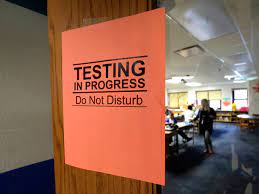What is the New Jersey Graduation Proficiency Assessment?

New Jersey is requiring students to pass the NJGPA in order to graduate.
February 16, 2022
For the past two years, state testing has been put to the side during COVID-19. Now with everything slowly going back to normal, state testing is making a comeback and students of classes 2023, 2024, and 2025 are required to take it. Governor Phil Murphy and his administration are presenting a new test starting with the class of 2023, the New Jersey Graduation Proficiency Assessment (NJGPA). The State Board of Education made this new graduation requirement official on September 8th, 2021.
All students will take the NJGPA during their junior year of high school. This assessment will be taken starting on March 14 and runs through March 18. If a student is unable to take the assessment on those dates, a makeup test will be proctored from March 21-25. In order for a student to graduate high school, a score of 750 or higher will need to be achieved. To me, its like another test I have to take. I am not worried about it, I feel confident that I will get a passing grade. It is a little stressful just because around that time I will be studying and worrying about the SATs”- Junior, Leeanna Buonpastore commented on how she felt about taking this test.
This computer based state test will be aligned to New Jersey Student Learning Standards for grade 10 English & Language Arts, Algebra I, and Geometry.
Students who complete the NJGPA but do not receive a passing score will have the chance to retake the assessment in the following summer or fall. If a student fails the test again, there are other alternatives that can be done. For instance, completing a portfolio will allow you to still graduate. One of these options needs to be done in order to receive a diploma.
New Jersey schools are required to give more tests this year despite the ongoing challenges due to the pandemic, and the mental health crisis happening between students and staff. Since students did school pandemic style for two years and didn’t get to fully grasp the contents being taught to them, the passing rates may be lower than in past years.



![Rakim’s celebration with attorney upon hearing not guilty verdict [Courtesy of NBC News]](https://whhspatriotpress.com/wp-content/uploads/2025/04/Rocky-aint-guilty.webp)



